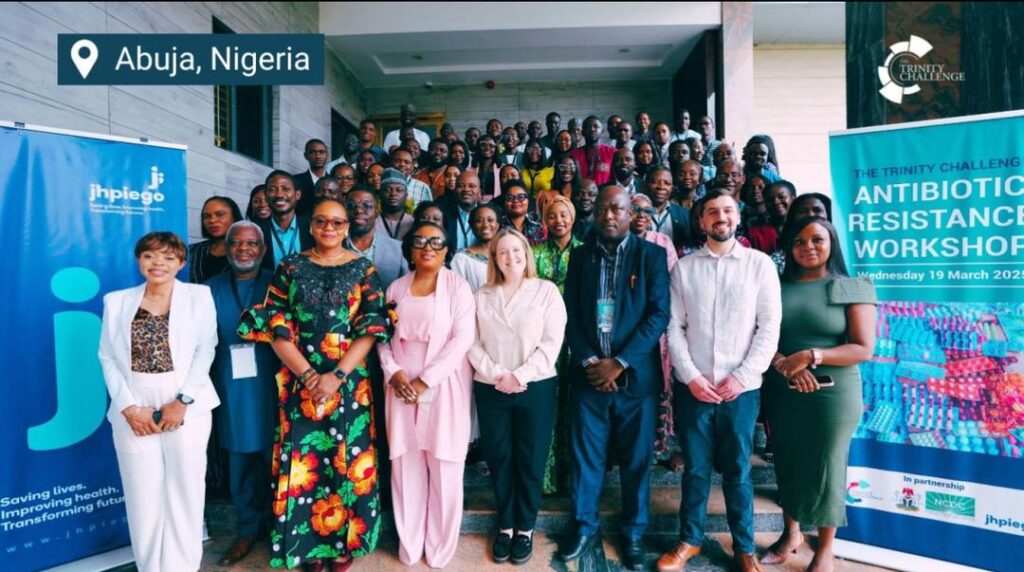…Seek Better Solutions to Tackle Infections
From Atiku Sarki, Abuja
In an effort to combat the rising threat of antibiotic-resistant infections in Nigeria and beyond, the Trinity Challenge, a charity supporting data-driven solutions to global health threats, has partnered with the Nigeria Centre for Disease Control and Prevention (NCDC) and Jhpiego to organize a high-level workshop in Abuja.
The event focused on addressing the prevalence of substandard and falsified antibiotics and finding innovative solutions to improve access to effective treatments.
The workshop, which commenced on Tuesday, brought together global and local health experts, researchers, and technology specialists to explore strategies for tackling antibiotic resistance, particularly in low- and middle-income countries (LMICs) like Nigeria.
Experts at the workshop highlighted the lack of access to effective antibiotics for both humans and animals. They examined two critical barriers: limited access to effective antibiotic treatments and the widespread availability of substandard or falsified oral antibiotics.
Through collaborative efforts, participants designed, tested, and proposed data- and technology-based solutions to address these challenges.
Speaking at the workshop, Louise Gough, Chief Operating Officer of the Trinity Challenge, emphasized the importance of collaboration in tackling antibiotic resistance.
“Today has been an extremely exciting and enlightening opportunity to work with colleagues in Nigeria, where there is a great wealth of health expertise and innovation. One of the major drivers of the antibiotic crisis is the lack of access to effective treatments, particularly in low- and middle-income countries. Today’s discussions showcased the power of multi-disciplinary collaboration to develop real solutions.”
Dr. Jide Idris, Director General of the NCDC, issued a stark warning about the severity of antibiotic resistance, stressing that it is an immediate crisis rather than a future concern.
“We may be walking with our eyes wide open into a future where antibiotics no longer work. AMR (antimicrobial resistance) is not a problem for tomorrow—it is a crisis we are facing now. If we fail to act, medicine will fail us at the time we need it most,” he further highlighted key drivers of AMR in Nigeria, including stockouts, unregulated sales, and low public awareness, which have turned treatable infections into life-threatening conditions.
“We must regulate distribution, expand access, and educate communities on responsible antibiotic use. At the NCDC, alongside our One Health partners, we are leading Nigeria’s AMR response through awareness campaigns, strengthened surveillance, infection prevention, antimicrobial stewardship, and ensuring access to quality antibiotics. However, this fight requires collective action and bold, innovative solutions.”
Dr. Yemisi Ogundare, Project Director at Jhpiego, emphasized that access to effective antibiotics is essential for safeguarding global health, particularly in LMICs.
“The challenges of stock control and substandard or falsified medicines do not just jeopardize treatment—they also contribute to preventable deaths, especially among children under five and vulnerable populations.”
He noted that an estimated 10% of human antibiotic consumption in LMICs consists of substandard or falsified antibiotics. Poor stock control further worsens the crisis, preventing life-saving medicines from reaching those who need them most. “Of the 7.75 million people who die from bacterial sepsis each year, nearly 3 million could have been saved with common, low-cost oral antibiotics like penicillin and amoxicillin.
These antibiotics are generally affordable, less likely to drive resistance, and should be widely available—especially for children under five, who are the most affected.”
The Abuja workshop aligns with the Trinity Challenge’s Community Access to Effective Antibiotics initiative, a new global innovation competition aimed at finding data-driven solutions for improving antibiotic stock control and eliminating substandard medications in LMICs.
As part of this initiative, a prize fund of up to £1 million was launched at the workshop to support innovative solutions. Applications for the competition are open until April 24, 2025.
With antibiotic resistance posing a serious global health threat, experts and stakeholders at the workshop emphasized the urgent need for collaborative action.
Through regulation, innovation, and community engagement, they aim to prevent a future where antibiotics become ineffective, leaving millions vulnerable to deadly infections. By leveraging data and technology, Nigeria and other LMICs can take significant steps toward ensuring access to high-quality, life-saving antibiotics for all.
